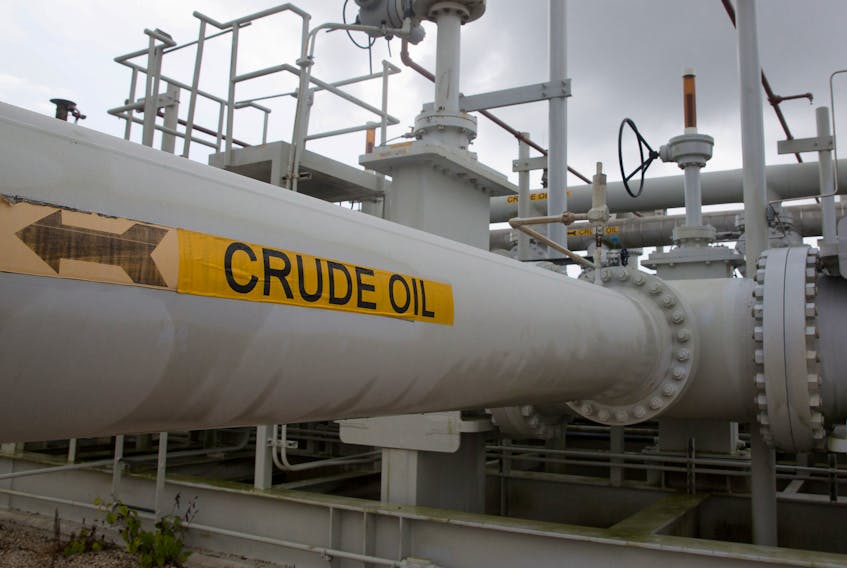CALGARY. Alta. – Canadian heavy oil prices are falling faster than global crude benchmarks as there is more oil in storage in Alberta now than six months ago when the provincial government took the unprecedented step of forcing domestic oil companies to slash output.
“The global price showed incredible weakness,” said Kevin Birn, vice-president North American crude oil markets at IHS Markit. “In Western Canada, we have the compounding issues of infrastructure takeaway and the inevitability of the call on crude-by-rail. We should expect the price in Western Canada Select to weaken to reflect that,” Birn said.
Indeed, the price for heavy oil in Canada fell more sharply this week than either the Brent or WTI benchmarks, which experts say is a reflection of ballooning oil storage within Alberta.
A barrel of WCS traded for an average of US$41.35 per barrel on Thursday, US$16.56 per barrel less than the price of WTI, which Birn said is partly a reflection of ballooning oil storage levels within Alberta.
U.S. West Texas Intermediate crude was largely unchanged Friday at US$57.91 a barrel — a weekly drop of nearly 8 per cent — its biggest weekly decline since December. In contrast, the WCS fell 16.7 per cent during the week, and has descended into bear market territory after falling more than 26 per cent from its year-to-date peak of US$56.30 on April 8, Bloomberg data shows.
Data from Genscape show oil storage tanks in Alberta filled up to a new record high of 37.11 million barrels of oil, over 60 per cent of total capacity, in the last week of April, the last month for which data is available. That surpassed the previous record of 37.07 million barrels for the week ended Jan. 4 – which was recorded just as the Alberta’s government’s mandatory curtailment order took effect.
“We are back to where we were on an inventory level in late 2018 and early 2019,” said Mike Walls, senior crude oil analyst with Genscape, which tracks oil storage levels and crude-by-rail movements.
The glut of oil in storage eased only slightly as the Alberta government, in a bid to rescue record-low heavy oil prices last year, forced major oil producers in the province to scale back their production. Genscape data shows there was an average of 33 million barrels of oil in storage in Alberta in February but that inventories rose sharply in March and April.
But now the discounts for WCS relative to WTI has widened once again to the point where crude-by-rail economics should work for most of the Canadian energy industry. Oil producers in Canada need a discount of at least US$15 per barrel to justify the additional price they pay to send their crude on railway cars at a time when existing pipelines are full.
Data released by the National Energy Board this week show oil-by-rail exports rose 29 per cent in March to 168,483 barrels of oil per day. This is well below the record-setting average of 353,789 bpd reached in Dec. 2018 when discounts between WCS and WTI were wider and before the Alberta government imposed its curtailment order.
But Genscape’s Walls said that given storage levels and current discounts, oil-by-rail movements should ramp back up to those levels over the summer. “We would be hitting that 300,000-barrels-per-day in late summer at least,” he said.
Imperial Oil Ltd. president and CEO Rich Kruger said last month that his company — which dramatically cut its oil-by-rail movements between Dec. 2018 and Feb. 2019 — was shipping 25,000 bpd on railway cars in March.
He said at the time the company would scale up as the WCS/WTI differential widened but company spokespeople declined to say whether the company was adding more oil-by-rail volumes given recent changes to the differential.
Other companies are also ramping up oil-by-rail movements but declined to say how quickly.
“Our plans haven’t changed at all,” Cenovus Energy Inc. spokesperson Ruth Anne Beck of how rising discounts affect its railway exports. She confirmed the company has received its first railcars from contracts signed last year and is on pace to ramp up its oil-by-rail shipments to 100,000 bpd by the end of the year.
IHS Markit’s Birn said he expects railway movements to hit new record highs of between 400,000 bpd and 500,000 bpd by the end of this year or early next year.
• Email: [email protected] | Twitter: geoffreymorgan
Copyright Postmedia Network Inc., 2019









